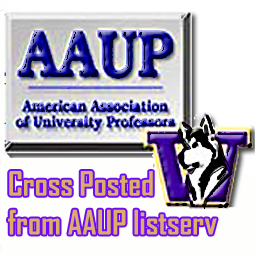
This is not a surprise. it SHOULD be a SENATE issue. How has the Administration taken these powers from the faculty? According to the Code, before it was covertly edited, the Faculty .NOT the Administration .. is responsible for curriculum and for faculty (ALL FACULTY not just tenured) teaching. If the Senate were doing its job, the Department of Global Health FACULTY COUNCIL (do you have one still?) should and could simply refuse to do the work. If the CODE is followed, the ADMINISTRATION WOULD HAVE NO RECOURSE. Of course, the Senate today is patterned after the Soviet Duma … no one wants to serve in the Senate because it is rightly seen as feckless. In effect, the Administration appoints the clique that runs the Senate and most lower campus Departments do mot even have effective Faculty Councils. That COULD be CHANGED. If the SEIU and the AAUP want an immediate impact on the UW, why not create a “political” party? With only a 100 Senate seats even a modest effort should be able to put together a few Senate seats that would be able to use the Senate as a tool to reassert faculty control over faculty functions. NOTE: I have cross posted this on THE Ave. Faculty concerned about UW controls on free speech are more than welcome to have posting privilidges on THE Ave.US.
Amy Hagopian, PhD
Dear Colleagues,
Those of you on upper campus may not be fully aware of how faculty get paid on the south side of Pacific Street. In most departments down here, faculty are responsible for putting together their own paychecks. You get some percentage points of your FTE for teaching, and the rest you fill in with grants (some you write yourself, some are grants that colleagues get and include you). You may be aware it’s getting harder to get grants in the health sciences, as NIH and CDC cut back.
To compensate, we will reduce faculty compensation for teaching. Specifically, faculty will now earn 3% of our FTE for each credit hour taught, rather than 4% as had been true until now. We will receive no compensation for mentoring thesis students or first year students, which has been true since the department was founded a few years ago. Further, any “service” obligations such as admissions committee, attending faculty meetings, and guest lectures are uncompensated. So, a person who isn’t paid to teach a course in DGH (and most faculty do not) could be asked to do quite a bit of work without any compensation whatsoever.
Unfortunately, our departmental and school leadership have been unsuccessful in convincing central administration that School of Public Health programs, with our relatively small class sizes catering to graduate students, can’t survive on the ABB formula.
This is one of the reasons why the UW chapter of the American Association of University Professors (AAUP) has joined a campaign to unionize the faculty through SEIU. Our view is that the steady erosion of state support for the university is unsustainable, and only a unionized faculty will be sufficiently organized to leverage our power in Olympia. When departments experience shortfalls, the default position is to cut faculty compensation. In a union scenario, central administration would be compelled to step in to help solve the problem, as a bargained contract would rarely allow unilateral cuts in pay. The four university campuses in the state that are unionized (Western, Central, Eastern and Evergreen) have found the legislature can also be compelled to kick in more resources when the faculty is organized.
In the meantime, you might wonder whether the UW has money to help out the School of Public Health. An AAUP analysis shows that while the state of Washington has pretty thoroughly abandoned higher education, the tuition increases we’ve charged have more than made up for the state legislature’s irresponsibility. UW administration could be making different choices, and could choose to support the school of public health better than it does.
The AAUP annual meeting was a starting point for this conversation. Find an account of the meeting here. Interested in talking more? Check out the Faculty Forward page. And let us know what’s happening in YOUR department with regard to financing.
Regards,
Amy Hagopian, PhD
Associate Professor
Director, Community Oriented Public Health Practice
University of Washington School of Public Health